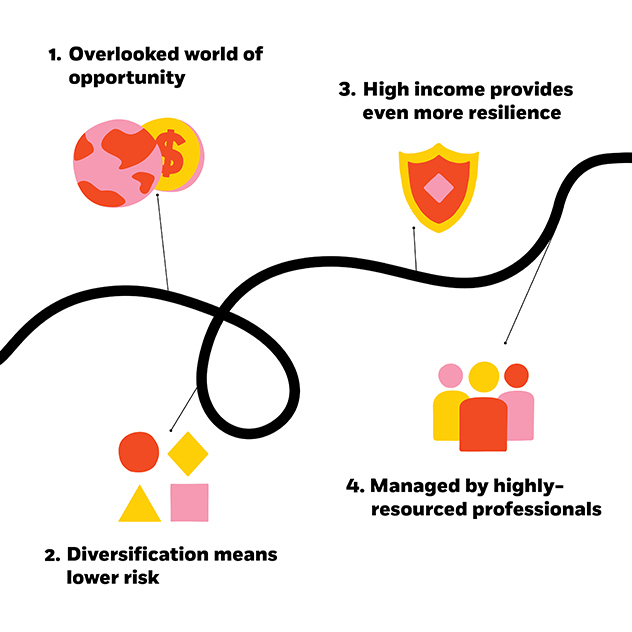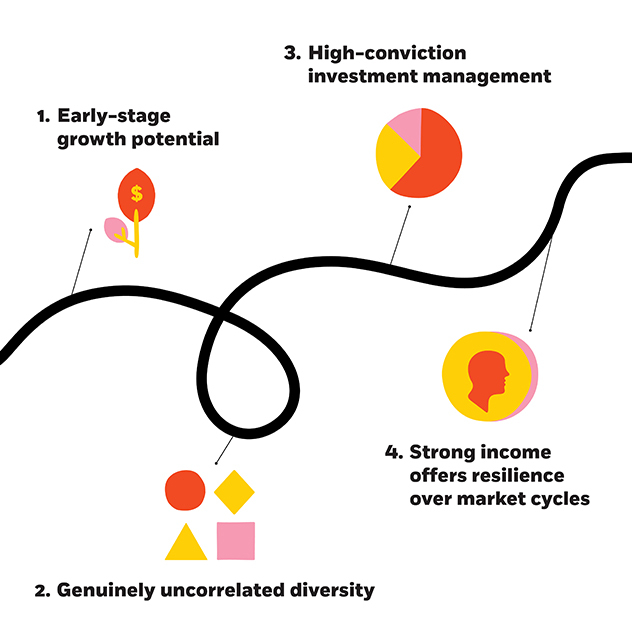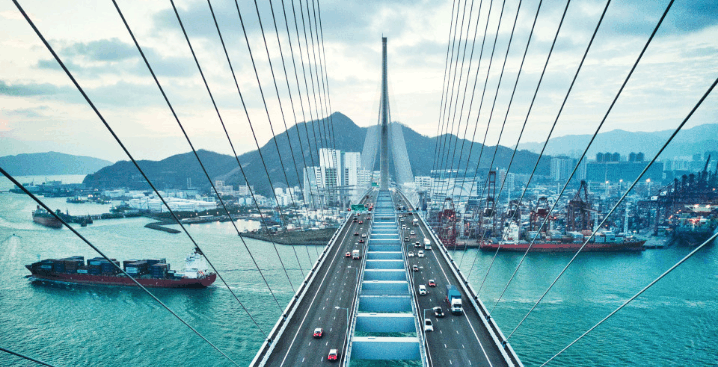Capital at risk. The value of investments and the income from them can fall as well as rise and are not guaranteed. Investors may not get back the amount originally invested.
Frontier markets, as we think about them, are really actually quite a large proportion of the world. So if you think that there are 25 developed markets and we don't invest in them, and then we also don't invest in the seven largest emerging markets China, India, Korea, Taiwan, Brazil, Mexico or South Africa. We do invest in all the other equity markets in the world.
We think now's a very appropriate time, and today is a good opportunity to be thinking across all of our frontier markets for the simple reason that we look at a series of markets today that are cheap compared to Western markets, cheap compared to their own history, and with very substantial dividend yields.
The companies in these countries are often growing 10 to 15% a year. They are growing in economies that are generally doing fairly well and in many cases, a lot better than what we are seeing in Western Europe today.
I think other pockets of interest for us at the moment will be in some of the smaller countries. So as we've come into this year, we've seen a weaker dollar, that actually is an environment that can be supportive for some of the countries that borrow from abroad in order to fund their growth, their stocks in Pakistan, Kenya, Egypt, Vietnam, Sri Lanka, all of these countries that are up more than 100% this year, we can see really significant opportunities in the United Arab Emirates and Saudi Arabia.
And there are few countries that are changed as dynamically as Saudi Arabia has in the last 7 to 10 years, a fact that many perhaps are unaware of. We see opportunities also in places like Kazakhstan, a country that fairly few people know about or understand the investment opportunities.
As an investment trust, we invest directly in stock markets in a number of smaller countries, which are really unlikely to feature in investors portfolios through any other vehicles that they have.
It's really important for us when investing in these countries that we think about the politics, the macroeconomics, fixed income, currency, and only then at the equities of these markets, we have to have a combination of a top down view as well as a bottom up view. And that bottom up view is typically generated by spending a lot of time on the ground.
We've been lucky enough to travel to 80 plus countries on behalf of BlackRock, looking at companies, their customers, the suppliers, the competitors, but also meeting all members of society, whether that is diplomats, journalists, trade unionists, opposition figures, students. Because we're not just investing in the country, we're investing in a society.
I think for those investors that are looking for growth, frontier markets offer some countries that are growing really nicely and much faster than we see in the developed world. For those investors who are looking for value, frontier markets are trading at big discounts both to the developed world and relative to their history. I think if you're looking for investors, who want yield, actually, the yield on the trust is really interesting, it's just over 4.5% at the moment. All of that is generated from the underlying income of the companies that we invest in. And I think the trust offers the most fantastic vehicle to be able to access these smaller, slightly more illiquid markets. Investing in frontier markets is not easy. It is risky.
And anyone investing in frontier markets has to have a medium to long-term time frame. When doing so, one has to have risk systems to ensure that our portfolios are in the BlackRock mantra deliberate, diversified and scaled. And it's absolutely critical when we think about investing in these countries, we build portfolios that have that long-term time horizon, but also incorporate the very best risk systems that BlackRock has to offer.
That's one of the reasons why being an investor sitting at BlackRock is a huge advantage, because of the relationships that we have globally with fixed income teams, with currency teams, with other equity teams. Being in a big firm is a huge advantage in being able to look at a fund that is trading in quite so many countries as we have in this trust.
About this trust
The BlackRock Frontiers Investment Trust plc (BRFI) opens the door to developing economies like Vietnam & Poland, which are often overlooked. These dynamic regions offer rare opportunities for potential long-term growth and diversification. With active management and deep local insight, the trust seeks out hidden value where others don’t venture.
Subject to change.
Diversification and asset allocation may not fully protect you from market risk. Emerging market investments are usually associated with higher investment risk than developed market investments. Therefore, the value of these investments may be unpredictable and subject to greater variation.
There is no guarantee that research capabilities will contribute to a positive investment outcome.
Portfolio Managers & Board of Directors
The Trust is governed by an elected Board of Directors
Unlocking the world’s untapped potential

This opportunity to access fast-growing frontier economies – which are typically overlooked by most investors – provides potential to find long-term growth.
Investing in frontier markets might seem risky. But this carefully selected portfolio of shares is lower risk, and offers genuine diversification from more well-trodden markets (such as UK equities).
Along with the potential for capital growth, the trust has historically paid an income of around 5%. This offers a solid cushion to total returns whenever markets get more volatile.
As with investing in any region, knowledge is key. The trust’s experienced team and disciplined approach to investing in frontier economies is supported by BlackRock’s on-the-ground infrastructure.
The smart diversifier you’re probably overlooking

Overlooked, under-researched and typically undervalued, share prices haven’t caught up with economic growth rates in frontier economies – offering a chance to tap into potential growth.
Frontier markets offer the rare opportunity of uncorrelated returns against other assets – especially attractive when more traditional markets might feel crowded.
A carefully selected and diversified portfolio of investments is managed by experienced, research-led portfolio managers who have full conviction in each of their ideas.
A reliable historical yield of around 5% supports total returns and provides comfort during periods of volatility.
Expert insight, on-the-ground intelligence

A focused portfolio of around 60 opportunities from frontier markets – an overlooked pool that’s off the radar of most investors, and which offers genuine diversification from mainstream exposures.
While we are fundamental-driven, company-specific investors we tend to focus on countries with structural growth and reform momentum that demonstrate compelling long-term prospects.
The portfolio’s core comprises companies in areas we believe stand to benefit from demographic tailwinds, such as rising income and digital adoption (financials, IT and consumer sectors, for example).
Insight, research, and valuation discipline are key. We employ strict screening for liquidity, governance and valuation to find well-governed businesses with strong cash flows and capital discipline.
The annual report gives investors a clear overview of the company's financial performance, including detailed revenue and profit analyses. It features the Chairman's statement, providing insights into the company's direction, and the Portfolio Manager's report, which details investment strategies and portfolio performance.

The half-year report updates investors on the company's financial performance, including key revenue and profit metrics. It includes a brief statement from the Chairman, offering insights into the company's progress and strategic direction for the first six months. Additionally, the Portfolio Manager's summary highlights investment strategies.

The factsheet provides an overview of the company's objective and strategy, including a monthly update of the company's performance. It highlights the portfolio's sector allocation and top 10 holdings, along with the portfolio managers' monthly commentary.
Latest insights

BRFI FAQs
-
The trust invests in the smaller economies of regions such as South-East Asia, Latin America, Africa and Eastern Europe. It excludes developed markets and the eight largest emerging markets, including Brazil, China, India, South Korea, Mexico, Russia, South Africa and Taiwan.
These markets tend to sit outside the mainstream and can be a source of long-term growth, often overlooked by global investors. They may share certain characteristics: younger populations, faster growth, and rising consumer demand.
-
BlackRock Frontiers Investment Trust aims to achieve long-term capital growth by investing in companies domiciled, listed in, or undertaking most of their activity in smaller emerging markets. These are countries that are not part of the MSCI World Index or among the eight largest countries in the MSCI Emerging Markets Index.
-
Frontier markets are idiosyncratic, sit outside the mainstream and require specialist skill. The trust is managed by Sam Vecht and Emily Fletcher, who bring decades of experience to investing in these markets. They are supported by BlackRock’s global emerging markets platform – a diverse team of investment professionals with deep regional expertise and comprehensive market coverage. First-hand, on-the-ground research is central to the team’s process.
There is no guarantee that research capabilities will contribute to a positive investment outcome.
-
The BlackRock Frontiers Investment Trust makes dividend payments once a year in September, though these depend on the profitability of the underlying companies and are not guaranteed.
-
The fortunes of companies in smaller emerging markets tend to have a more direct relationship with domestic economic growth. These are emerging economies, with less developed capital markets. Their stock markets can be volatile as a result. However, the risks are idiosyncratic and these countries are often only lightly correlated to each other. By combining different countries and sectors, the fund managers seek to mitigate risk. These smaller emerging markets may also be less influenced by global factors and can therefore provide diversification from mainstream developed markets.
Risk management cannot fully eliminate the risk of investment loss.
Diversification and asset allocation may not fully protect you from market risk.
The risk indicator is shown in the Key Information Document KIID. The summary risk indicator is a guide to the level of risk of this product compared to other products.
-
The most up-to-date share price, along with a range of other information, can be found on the BlackRock Frontier Investment trust dedicated website.
Annual General Meeting
On 5 February 2025, Portfolio Managers Sam Vecht, Emily Fletcher and Sudaif Niaz, provided an update on the Company's progress and the year ahead.
Capital at risk. The value of investments and the income from them can fall as well as rise and are not guaranteed. Investors may not get back the amount originally invested
This material is not intended to be relied upon as a forecast, research or investment advice, and is not a recommendation, offer or solicitation to buy or sell any securities or financial product or to adopt any investment strategy. The opinions expressed are as of February 2025 and may change as subsequent conditions vary.
Latest company announcements
Capital at risk. The value of investments and the income from them can fall as well as rise and are not guaranteed. Investors may not get back the amount originally invested.
Filter by type:
Filter by date period:
Sign up for Regulatory News Service alerts
To receive email alert notifications once an update to the Trust occurs, please sign up and select the updates you would like to receive via The Association of Investment Companies website here. Please be aware by clicking on this link you are leaving BlackRock and entering a third party’s website. As such, BlackRock is not liable for its content.
Useful information
Capital at risk. The value of investments and the income from them can fall as well as rise and are not guaranteed. Investors may not get back the amount originally invested.
Fees & Charges
Annual Expenses as at Date: 30/09/2025
Ongoing Charge (excluding any Performance Fee): 1.42% as at 30/09/2025
Ongoing Charge (including any Performance Fee): 2.87% as at 30/09/2025
Management Fee Summary: 1.10% per annum of the Company’s nets assets up to US$650m, reducing to 1% on net assets above this amount. Performance fee 10% of any NAV outperformance of the MSCI Frontier + Emerging Markets ex Selected Countries Index (net total return, USD).
-
ISIN: GB00B3SXM832
Sedol: B3SXM83
Bloomberg: BRFI LN
Reuters: BRFI.L
LSE code: BRFI
-
Name of Company: BlackRock Fund Managers Limited
Telephone: 020 7743 3000
Email: cosec@blackrock.com
Website: https://www.blackrock.com/uk
Correspondence Address:
Investment Trusts, BlackRock Investment Management (UK) Limited, 12 Throgmorton Avenue, London EC2N 2DL
Name of Registrar: Computershare PLC
Registered Office: 12 Throgmorton Avenue, London EC2N 2DL
Registrar Telephone: +44 (0)370 707 4027
Place of Registration: England
Registered Number: 5612963
-
Year End: 30 September
Results Announced: May (half yearly), November/December (final)
AGM: February
Dividends Paid: February (final), June/July (interim)
ESG Integration
The fund noted above does not commit to sustainable criteria nor does it have a sustainable investment objective.
BlackRock considers many investment risks in our processes. In order to seek the best risk-adjusted returns for our clients, we manage material risks and opportunities that could impact portfolios, including financially material Environmental, Social and/or Governance (ESG) data or information, where available. See our Firm Wide ESG Integration Statement for more information on this approach and fund documentation for how these material risks are considered within this product, where applicable.
Portfolio manager biographies
Capital at risk. The value of investments and the income from them can fall as well as rise and are not guaranteed. Investors may not get back the amount originally invested.
Sam Vecht, CFA, Managing Director, is co-Head of the EM & Frontiers Team as a part of BlackRock's Fundamental Equity Global Emerging Markets Platform. Mr. Vecht is a portfolio manager on the long-biased Emerging Markets Equity Strategies and long-only Latin America strategies. He is also a named portfolio manager on the Emerging Frontiers Hedge Fund and Frontiers portfolios. Mr. Vecht maintains a senior advisory role on the long-short Asia Pacific Absolute Return strategy, which is managed by the EM & Asia Core Team.
Mr. Vecht's service with the firm dates back to 2000, including his years with Merrill Lynch Investment Managers (MLIM), which merged with BlackRock in 2006.
Mr. Vecht earned a BSc degree, with honours, in international relations and history from the London School of Economics. He is also a CFA Charterholder.
Emily Fletcher, CFA, Managing Director, is a portfolio manager and a research analyst on the Global Emerging Markets Equities Team within BlackRock’s Fundamental Equity Group. She is responsible for co-managing the BlackRock Frontier Investment Trust, the Emerging Frontier hedge fund, Emerging Markets Sustainable Equity and the Emerging Market Equity Income strategies.
Mrs. Fletcher joined the Emerging Markets team in 2008 and since then has covered African, ASEAN, Frontier and Latam equities and is based in London.
Prior to moving to her current role in 2008, Ms. Fletcher was a member of the Multi-Asset Portfolio Strategies (MAPS) group and the UK Equity team. She joined BlackRock as an Analyst in 2006.
Mrs. Fletcher earned a BA degree and an MSc degree in experimental and theoretical physics, both from the University of Cambridge in 2005 and 2006, respectively.
Board of directors
All the Directors are independent of the Investment Manager and are members of the Audit & Management Engagement Committee.
Katrina Hart (Chair with effect from 6 February 2024) (date of appointment 1 October 2019) is currently a non-executive director of AEW UK REIT plc, Montanaro Asset Management Limited and Chair of JP Morgan UK Small Cap Growth and Income plc. She was formerly a non-executive director of Keystone Positive Change Investment Trust plc (where she was also the Senior Independent Director), Premier Miton Group plc and Polar Capital Global Financials Trust plc. Mrs Hart spent her executive career in investment banking, advising, analysing and commentating on a broad range of businesses. Initially working in corporate finance at ING Barings and Hawkpoint Partners, she then moved into equities research at HSBC, covering the General Financials sector. Latterly, Mrs Hart headed up the Financials research teams at Bridgewell Group plc and Canaccord Genuity, specialising in wealth and asset managers.
Stephen White (Chairman of the Audit and Management Engagement Committee) (appointed 13 July 2016) is currently a non-executive Director of Polar Capital Technology Trust plc and Chairman of Brown Advisory US Smaller Companies plc. He was formerly a non-executive director of Henderson Eurotrust plc, Aberdeen New India Investment Trust plc, JP Morgan European Discovery Trust plc, Global Special Opportunities Trust plc, Head of European and US Equities at British Steel Pension Fund, Head of European Equities at F&C Investment Management, Manager of F&C Eurotrust plc and Deputy Manager of the F&C Investment Trust plc. Prior to joining F&C in 1985, he held positions at Hill Samuel Asset Management, Phillips & Drew and PriceWaterhouse. He is a Chartered Accountant.
Hatem Dowidar (date of appointment 7 February 2024) is the Group CEO of e& and also holds roles as a non-executive Director of Vodafone Group, Etihad Etisalat Company (Mobily), Maroc Telecom & Etisalat Egypt. Previously, he worked for Vodafone, Procter and Gamble as well as Daimler Benz Group in various roles. He is a member of international forums such as the board of the GSM Association and the leadership panel of the United Nations Internet Governance Forum (IGF). His academic background includes a Bachelor’s in Communications and Electronics Engineering and an MBA.
Liz Airey (Senior Independent Director with effect from 6 February 2024) (date of appointment 10 December 2021) is currently Chairman of abrdn UK Smaller Companies Growth Trust plc, Chairman of Rolls-Royce UK Pension Fund Trustees Limited and a member of the Investments Committee of the Royal Horticultural Society. Previously she was non-executive Chairman of Jupiter Fund Management plc, a non-executive Director of Tate & Lyle plc, Dunedin Enterprise Investment Trust plc, Kirk Lovegrove & Company Limited, a member of the advisory board of Ownership Capital and a member of the Investment Committee of the Institute of Chartered Accountants in England and Wales. In her executive career she was Finance Director of Monument Oil and Gas plc, a post she held from 1990 until the sale of the company to Lasmo plc in 1999.
Lucy Taylor-Smith (date of appointment 10 December 2021) was previously Global Head of Strategy with Standard Chartered Bank based in Singapore. Prior to this, she was Chief Strategy Officer and a member of the Executive Committee at Manulife Asia, and Chairman of Manulife Singapore, as well as Chief Strategy Officer and Board Director for Prudential Corporation Asia. She also spent 13 years with UBS advising companies on a wide range of strategic initiatives and corporate transactions encompassing mergers and acquisitions, equity and debt capital markets deals, culminating in her position as Executive Director of Corporate Broking.
Christopher Casey (date of appointment 1 October 2025) is non-executive Director and Chairman of CQS Natural Resources Growth and Income PLC, non-executive Director and Chairman of the audit committee of Life Settlement Assets PLC and non-executive Director of Fidelity Special Values PLC. He has extensive experience as a non-executive director and audit committee chairman of public companies, in particular, investment trusts. His career spans over 40 years. He was previously an audit partner at KPMG LLP. Since then, he has carried out a number of non-executive board roles serving as audit committee chairman and then chairman of The European Smaller Companies Trust PLC, audit committee chairman of BlackRock American Income Trust PLC, audit committee chairman of Mobius Investment Trust PLC, audit committee chairman and then chairman of China Polymetallic Mining Ltd, Audit Committee chairman of Latchways PLC, and audit committee chairman and then interim chairman of Eddie Stobart Logistics PLC.
What are the risks?
Counterparty Risk The insolvency of any institutions providing services such as safekeeping of assets or acting as counterparty to derivatives or other instruments, may expose the Fund to financial loss.
Currency Risk The Fund invests in other currencies. Changes in exchange rates will therefore affect the value of the investment.
Emerging Markets Emerging markets are generally more sensitive to economic and political conditions than developed markets. Other factors include greater 'Liquidity Risk', restrictions on investment or transfer of assets and failed/delayed delivery of securities or payments to the Fund.
Frontier Markets Frontier markets are generally more sensitive to economic and political conditions than developed and emerging markets. Other factors include greater 'Liquidity Risk', restrictions on investment or transfer of assets and failed/delayed delivery of securities or payments to the Fund. There may be larger fluctuations to the value of your investment and increased risk of losing your capital.
Gearing Risk Investment strategies, such as borrowing, used by the Trust can result in even larger losses suffered when the value of the underlying investments fall.









